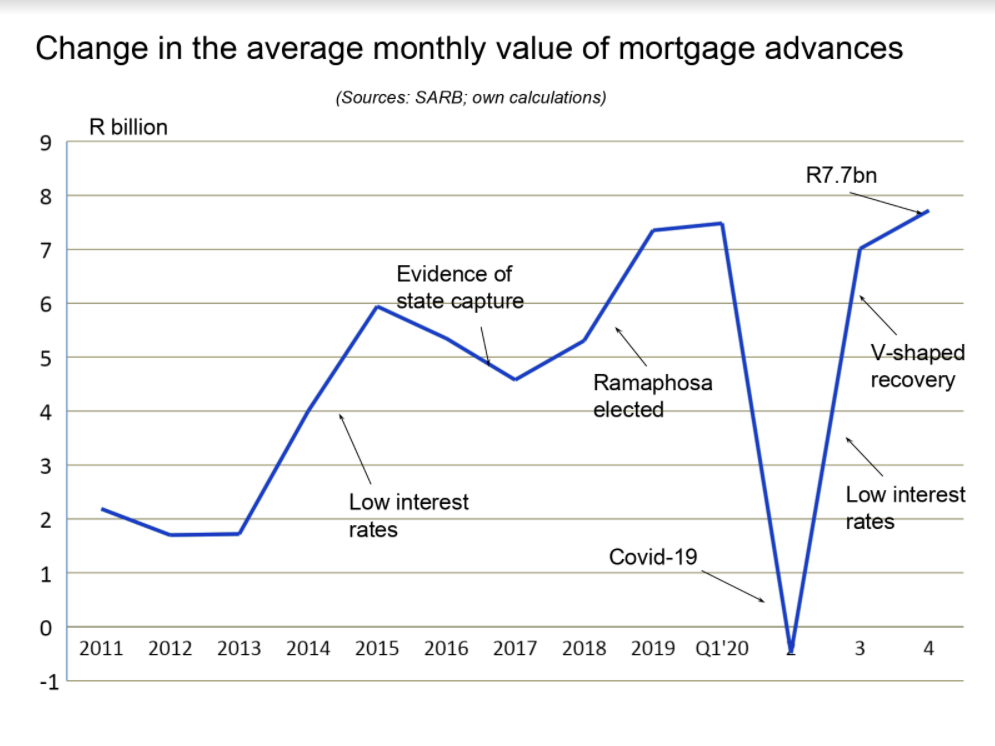Like several other indicators, trends in mortgage advances by the banking sector reflect key moments in South Africa’s history over the past decade. Shortly after the global financial crisis of 2008/09, the total value of mortgage advances recovered only slowly, at an average annual rate of just over 2% at current prices, which translated into a marginal decline in real terms.
Low interest rates
Due in large part to an accommodating monetary policy stance by the previous governor of the South African Reserve Bank, Gill Marcus, new mortgage advances started picking up steam between 2013 and 2015, with the rate of growth outstripping the inflation rate. During the tenure of Gill Marcus, the average real prime overdraft rate was 3%.
Unfortunately, investor confidence took a serious dip in 2016 and 2017, when a competent finance minister (Nhlanhla Nene) was fired by the country’s previous president, Jacob Zuma, who had overseen a rapid escalation of corruption and incompetence in the public sector, especially at certain key state-owned enterprises (SOEs).

Predictably, this led to a decline in the rate of net new mortgage advances, a trend that was also to be influenced by a newly appointed monetary policy committee (MPC), which immediately adopted a hawkish stance towards monetary policy, ultimately leading to a doubling of the real prime overdraft rate (from around 3% to 6%).
Investor confidence declined as a result of the pervasive nature of corruption and fraud, as well as the high interest rate environment, which acted as a de facto tax on venture capital.
Infrastructure deficiencies, especially with regard to roads and electricity supply, also acted as a deterrent to new investment in productive capacity, which, in turn, led to declining levels of activity in the construction industry.
Between 2013 and 2016, the Afrimat Construction Index (ACI), a barometer of economic conditions in construction, increased by more than 20%.
Between 2017 and the first quarter of 2020 (prior to the pandemic), the ACI declined by 15%, reflecting the sad state of affairs in a sector that is crucial to the future development of the country.
Recovery of loans and building plans
A measure of investor confidence started returning after the election of Cyril Ramaphosa, first as leader of the ANC and a year later as president of the country, with 2018 recording the highest real growth rate in net new mortgage advances in a decade.
Then came the pandemic and growth in this indicator turned negative in the second quarter of 2020.
The third and fourth quarters witnessed a remarkable recovery, however, with the average monthly increase in mortgage advances closing in on a level of R8-billion – an early sign of recovery in the property market and proof of the inverse correlation between interest rates and credit extension.
The construction sector also seems set for recovery, as evidenced by the latest data on the value of building plans passed by the country’s larger municipalities. In November 2020, the latter amounted to R9.2-billion, which represented an increase of 21% over November 2019.
Residential building plans initially led the way since the relaxation of the most stringent lockdown regulations, but the value of approved plans for non-residential buildings also staged a remarkable recovery in November – up by almost 150% over a year earlier.
With the implementation of some of the government’s ambitious strategic infrastructure projects bound to gather momentum as soon as the coronavirus threat starts dissipating, construction could well experience a bumper year in 2021. BM/DM

















 Become an Insider
Become an Insider
An early recovery in the construction industry and a bumper year in 2021 is a future very much worth wishing for.
I hope that the mortgage advances and plan approvals you refer to result in actual new builds, and that the impact can be felt in increased employment levels and worker’s salaries before the end of 2021.